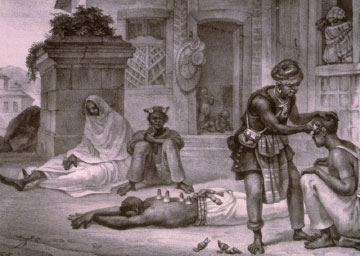Rufino José Maria early 19th c. — ?

Rufino José Maria was born in Oyo near the Bight of Benin in West Africa (modern day Nigeria) during the early nineteenth century. The Oyo Empire ruled much of Yorubaland, which had a large Muslim community that was composed of not only Yoruba-speaking inhabitants but also Hausa slaves. In 1817, tensions between Muslims and Oyo traditionalists erupted in the form of a slave rebellion. It was in this context of rebellion and turmoil that Rufino was captured and sold to Portuguese slave traders.
In 1822 or 1823, Rufino arrived in Bahia, Brazil, and was purchased by a druggist who lived in Salvador and trained Rufino as a cook. Between 1830 and 1833, Rufino was sold to José Maria Peçanha, a high court judge.
Two years later, Rufino obtained his freedom and adopted his former master’s name becoming Rufino José Maria. He then became involved in the business of the slave ship Ermelinda, not only as an employed cook but also as an investor. A British patrol ship captured the Ermelinda off the coast of Angola on October 21, 1841.
Though the voyage became an economic failure for Rufino, the time spent awaiting trial in Sierra Leone was one of religious inspiration. Rufino studied in Fourah Bay, where he improved his knowledge of Islam and the Arabic language. Rufino returned to Brazil and settled in Recife in 1845. There, Rufino began his profession as a healer, practicing a type of Islam that incorporated practices that reflected African religious traditions.
In 1853, a number of free people of color and freedmen in Recife, including Rufino, were arrested under suspicion of their involvement in a slave conspiracy. The authorities feared that the conspirators secretly taught enslaved people how to read and write in Arabic. During his interrogation by authorities Rufino, described as a “‘fat old man’ nearly fifty years old,” reportedly kept calm. Police determined that he was not a threat and released him.
In the economic, religious, and social contexts of his life, Rufino is representative of vast numbers of freedpeople, who gained valuable knowledge and livelihoods within the contraints of a system governed by slaveholding interests.







